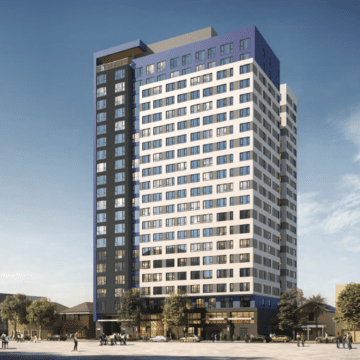A last-ditch effort to derail a high-rise residential tower near San Jose State University has been denied, opening the way for more housing downtown.
The San Jose Planning Commission voted unanimously Wednesday to approve a 23-story, 248-foot apartment building one block from the university called The Mark. Commissioner Jorge Garcia abstained from voting because of an immediate family member who lived near the project site until recently.
The appeal was originally planned to be voted on last month, but commissioners couldn’t reach a consensus due to uncertainty about how many affordable units the project required per city and state laws.
“We all recall three weeks ago there was some confusion,” said Commission Chair Rolando Bonilla. “Clearly that time was not only well used, but helped in terms of framing tonight’s conversation.”
As part of the approval, buildings on the site owned by downtown resident and property manager Steve Cohen, who filed the appeal, will be demolished—including two existing multi-family residential buildings and one single-family home.
The city’s planning director previously approved the project in July.
The project’s developers, Urban Catalyst, purchased the land in early 2020 for $6.25 million. Units will be designed for one to four bedrooms and will bring “student-focused” amenities, such as common rooms and gym equipment. Urban Catalyst expects The Mark to house more than 850 students.
The 240-unit apartment tower will bring much-needed student-focused housing to the surrounding university neighborhood.
“I want to thank city staff for really digging in on this and clarifying,” said Commissioner Charles Cantrell. “It was really as cloudy as Mississippi mud.”
The city met with Urban Catalyst last week to clarify the number of affordable housing or rent-stabilized units needed to comply with city and state regulations. The developer must now select one of two options to comply: Either designate 120 units to fall under rent stabilization according to the city’s apartment rent ordinance, or request the city waive the requirement so long as 20% of the units—or 48 apartments—are on-site affordable.
A representative from Urban Catalyst said its team is still consulting to decide which of the two options to choose.
“There’s a myriad of factors we’ll explore as we go forward, including financing and market conditions,” said Alex Sinunu, development manager at Urban Catalyst. “We don’t have a preference at this point.”
Rent-stabilized units are those where landlords are restricted from raising rent above a certain percentage in a specific time period. Under the city’s apartment rent ordinance, the maximum allowable rent increase is 5% in a 12-month period. An on-site affordable unit is a unit in a housing complex priced according to the area’s median income.
Cohen filed the appeal against the project hoping to block its approval. He claims there wasn’t enough outreach between the city and local property owners, that he was refused a hard copy of the project’s plans and that the surrounding buildings won’t blend in with the tower. He also says there is inadequate parking and the project is too big for the lot.
City officials said due to the COVID-19 pandemic, online meetings were limited and that the city did its own community outreach.
“I got 41 tenants. They’re online on Zoom meetings all day,” Cohen told San José Spotlight. “What does COVID have to do with it? It’s ridiculous.”
There was one public meeting for the project in September 2020, according to the city’s website, where Cohen claims four people attended. City officials say 32 people tuned in on Zoom and one called in.





